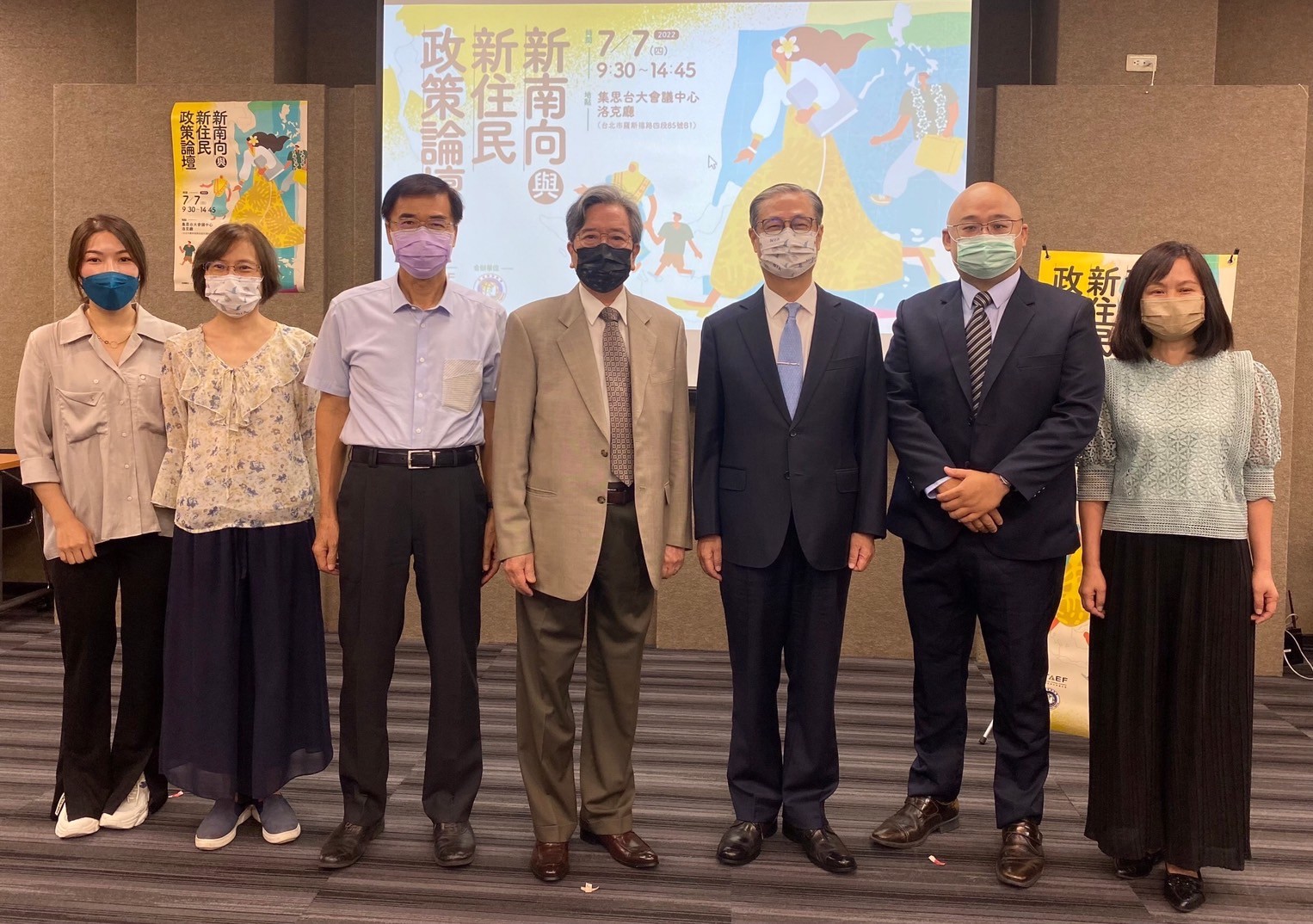
According to the National Immigration Agency (NIA) of the Ministry of the Interior, as of January 2022, more than 160 thousand new immigrants from Southeast Asia are now living in Taiwan. Simultaneously, the government is paying more attention to this community putting down roots in Taiwan, where multifaceted care measures have been rolled out and expanded in their implementation from the local governments to the central government with inter-departmental coordination and resource consolidation.
Against this background, Taiwan-Asia Exchange Foundation (TAEF) joined hands with the NIA in organizing The New Southbound and New Immigrants Policies Forum on July 7. Government representatives, experts, scholars, and new immigrant representatives were invited to exchange wisdom on three main topics, namely the Native Language Education of New Immigrants’ Children and Applications, Public Participation of New Immigrants, and Empowerment of New Immigrants.
In his welcoming remarks, Chairman Michael Hsin-Huang Hsiao of TAEF said that the forum embodies the spirit of two “new” and five “Ms.” The first “new” refers to the New Southbound Policy, which has been expanded into five flagship programs and five action plans throughout the years; The second “new” represents the new immigrants, who have significantly added momentum to public-private partnerships in Taiwan. Meanwhile, the five Ms refer to Make Money, Make Jobs, Make friends, Make family, and, most importantly, Make Values. Chairman Hsiao highlighted the fact that Taiwan is the only country that has incorporated the concept of family in its regional policy. Building upon this foundation, he called for more collaboration between communities in Taiwan, so that while the New Southbound Policy begins from family, “charity can also begin at home.”
In his keynote, Director-General Bill Chung stressed the importance of making Taiwan feel like “a home from home” for the new immigrants. This would require public-private partnerships, regulatory relaxation, non-discriminatory treatment, and a friendly environment that respects diversity to make the success formula work.
For the first topic, President Mu-Yin Huang of Chung-Yuan Elementary School in Taoyuan stressed the importance of diversified teaching strategies for native language education of the new immigrants which is why it is essential to include those languages as different subjects in the syllabus. Tran Ngoc Thuy, a program host of Radio Taiwan International agreed that languages can open the door to unlimited opportunities. Meanwhile, Professor Ying-Hsing Yang of the National Taichung University of Education and CEO Hsiao Hsiu-ling of the Pearl S. Buck Foundation called for more social resources to be invested in the design of new immigrants’ native language education and take into account the provision of such education to new immigrants’ children in policy making.
For the second topic, Legislator Loh Meei-Ling expressed that it is important to ensure the participation of new immigrants in public affairs to ensure their rights and interests are protected and to deepen the foundation of democracy in Taiwan. This goal can only be achieved with everyone living on the same land coming together. NIA Immigration Affairs Division head Huang Ling-yu said that empowerment is at the core of diverse development. Yan Pei-Ying, an officer of the NIA and a new immigrant stressed that the new immigrants are able to wield unique influence within the society.
When discussing the empowerment of new immigrants, Rita Pawestri Setyaningsih from the National Research and Innovation Agency (BRIN) in Indonesia suggested that the education for new immigrants in Taiwan can be designed in such a way that harnesses the community’s strengths built upon their unique culture. Director Li Yu-Chuan of the Department of Lifelong Learning of the Ministry of Education also highlighted that Taiwanese society needs to establish mutual support and learn together. Other panelists emphasized the importance of respecting equality and directing more media resources to promote communication between the new immigrants and others in the society.
The forum was concluded with a vote of thanks by Dr. Alan H. Yang, the Executive Director of TAEF, who reiterated the importance of 3Ts, Target (the policies across the whole society), Tools (such as policies, shall be diversified in their applications), and Transformation (from being tolerant to being together), to cultivate a sense of “we feeling” within the society.
TAEF will further present the results of a full examination of policies targeting the new immigrants in Taiwan at this year's Yushan Forum in October.